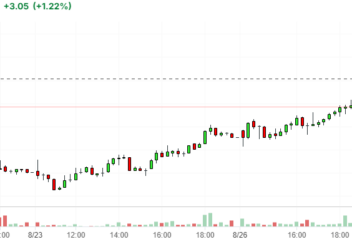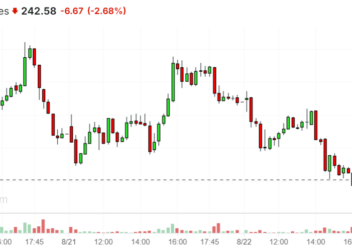Coffee Prices Fluctuate Amidst Rising Exports from Brazil
Coffee prices saw a notable shift today, with September Arabica coffee futures (KCU24) closing at $240, marking a drop of -1.00 (-0.41%). Similarly, September ICE Robusta coffee (RMU24) futures fell by -45 (-1.00%). After an initial rally driven by concerns over potential crop damage from freezing temperatures in Brazil, prices reversed course, largely due to a significant increase in Brazilian coffee exports.
Overview
Today’s coffee market experienced volatility, with prices initially rising on worries about freezing temperatures in Brazil potentially harming coffee crops. However, this early optimism was dampened as news emerged that Brazil’s coffee exports had surged significantly. The Brazilian Trade Ministry reported a 44% year-on-year increase in July coffee exports, reaching 202,000 metric tons. This surge in supply led to a reversal of the earlier price gains.
Additionally, broader global coffee supply trends have been influencing market movements. Data from the International Coffee Organization (ICO) revealed a 3.8% year-on-year increase in global coffee exports in June, reaching 10.78 million bags. For the October to June period, global coffee exports were up 10.1% year-on-year, totaling 103.47 million bags. These factors combined have contributed to the current fluctuations in coffee prices.
Early Gains Driven by Weather Concerns
Prices initially rose as traders reacted to forecasts predicting near-freezing temperatures in Brazil next week, raising fears of potential crop damage. This concern briefly drove Arabica to a one-month high and Robusta to a two-and-a-half-week high. However, the market’s optimism was short-lived.
Impact of Increased Brazilian Exports
The increase in Brazilian coffee exports has added a significant amount of coffee to the global supply, putting downward pressure on prices. The sharp rise in export volumes reported for July has overshadowed the initial concerns about weather-related crop damage.
Global Supply Trends
The recent increase in global coffee supplies also contributed to the downward pressure on prices. With global coffee exports rising by 3.8% in June and up 10.1% year-to-date, the market is experiencing a surplus that is impacting prices.
As the coffee market continues to react to these shifting dynamics, stakeholders will be closely watching weather developments in Brazil and global supply trends for further indications of future price movements.



